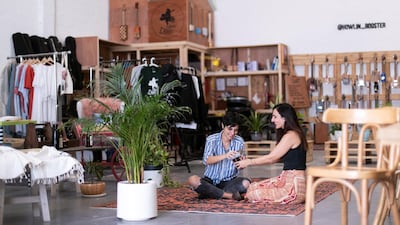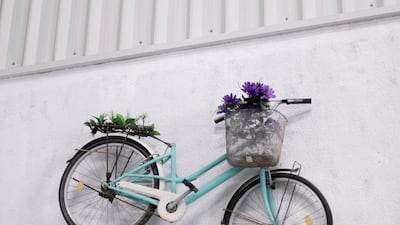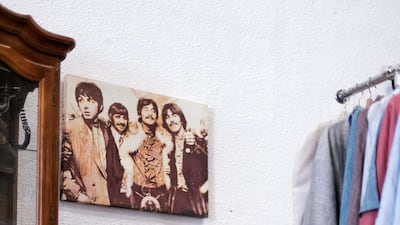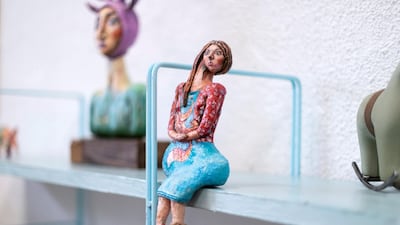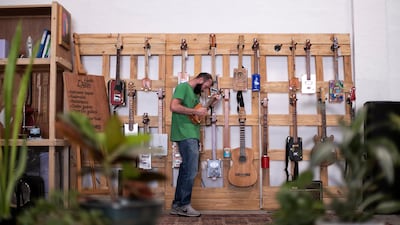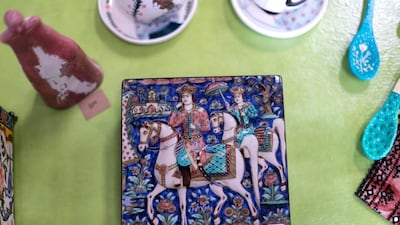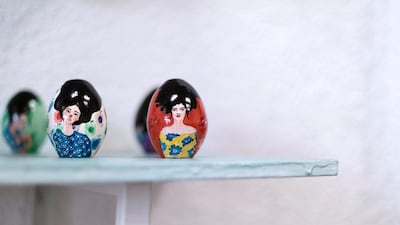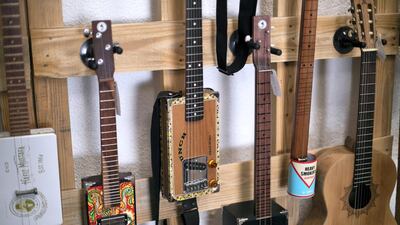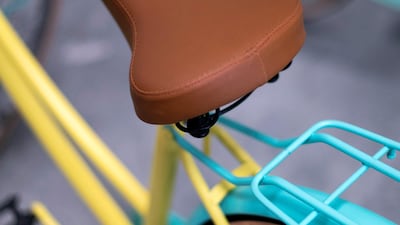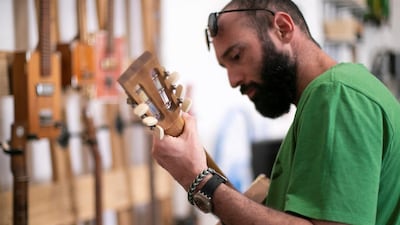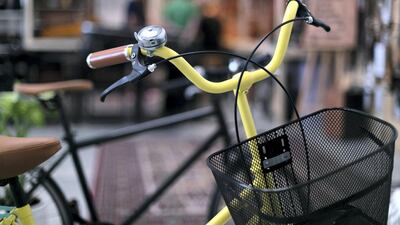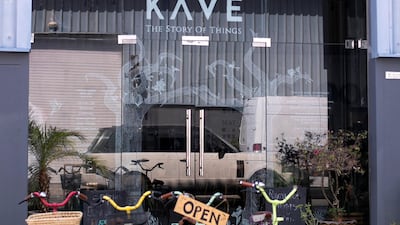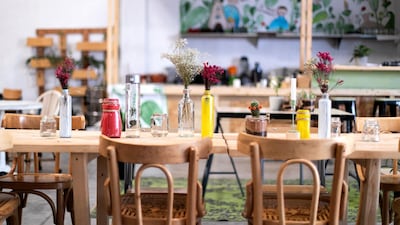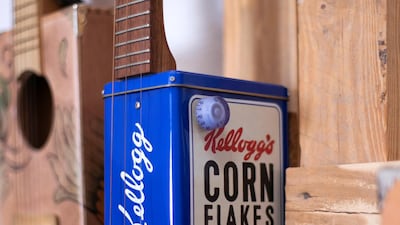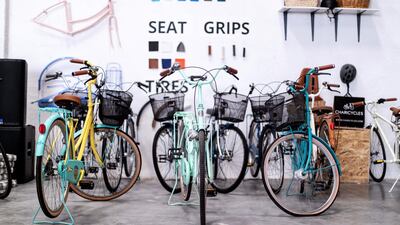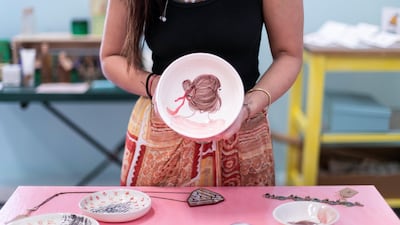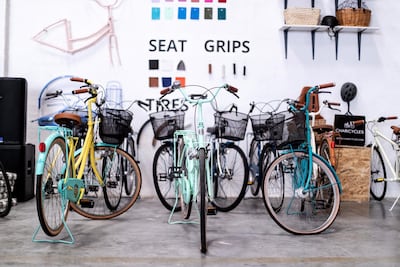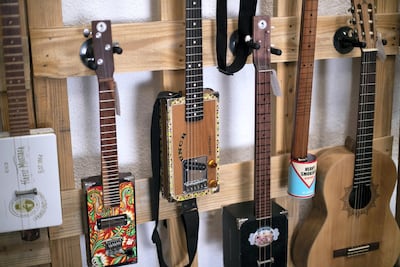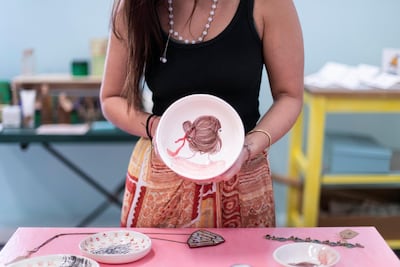Rania and Zaina Kanaan are no strangers to thinking outside the box – and then turning that box into something useful that doesn’t harm the environment.
It was six years ago when they started their company, Charicycles, creatively reusing old and building new bikes from scraps passing through Dubai from Japan. Since launching, the sisters have sold about 1,000 of these cheerful vintage creations. For every bike purchased, the company donates one to a child in a Palestinian refugee camp.
Getting inspired
It was happy Charicycles customers who sparked the sisters' latest venture, Kave – The Story of Things, which opened in Dubai's Alserkal Avenue in March as a cafe, fair trade boutique, guitar shop and workshop space.
“We were getting a lot of clients who came back saying: ‘What else can you sell us that is like this?’” says Zaina, who has a background in marketing and finance. “And we were like: ‘A helmet, a pump’ – like what else can you sell if you are a bike company?”
Slowly, the sisters saw that the way forward was offering products and services that adhere to the core principle of being kind to yourself and your community, to people both near and far, as well as to nature. People increasingly want to engage with businesses that are ethical in the way they source their products – not only in what impact they have on the body, but also the environment, adds Zaina. “This kind of sensitivity to what business has become is something people have an appetite for.”
The Palestinian sisters, who are in their early thirties – Zaina is older by two years – moved to Dubai 12 years ago to join their parents. They spent their formative teen years in Montreal following stints in Saudi Arabia and Jordan. It was their time in the cosmopolitan French-Canadian city that played a big part in shaping their expansive outlook and inclusive ideology.
“It’s such an open city that embraces so much diversity, it’s so great to see,” says Rania, who has a background in entrepreneurship and economics. “It’s not about tolerating difference, it’s about embracing difference.”
New partnerships
Inside their 288-square-metre space in Dubai, past the row of Charicycles parked outside, are upcycled guitars made courtesy of the sisters' partnership with Howlin' Rooster, a local brand of handcrafted guitars upcycled from cigar boxes.
Meanwhile the Roots Bistro cafe has a menu that mostly features food grown or raised by local farmers. "It came from a really huge passion, after living in the UAE for 12 years and asking myself: 'Have you ever eaten food that is grown from the land entirely?' And the answer was no," says Zaina. "I go to the supermarket, I pick up fruits and vegetables, and I have no clue most of the time that it's not from here."
The Roots Bistro and Kave partnership aims to educate through the plate, and dishes include sweet potato gnocchi with kale, a vegan hot dog made from beans and a dish featuring raised-in-the-UAE lamb. “Whether you’ve been living here for a year or even if you’re on vacation, it’s good to know that there are a lot of farmers growing organic produce in greenhouses, and that this produce is really healthy, does not fly overseas and does not increase CO2 emissions [for it] to be put on my table to eat,” says Zaina.
The workshops offered to the community
Kave’s fair trade shop contains a mix of items, including clothing, ceramics and art produced by female artisans, many of whom are underprivileged or refugees. There are pieces from Exhale, a made-in-the-UAE minimalist clothing and accessories e-commerce brand, as well as all-natural cleaning products from The Botanist. Stock is kept to a minimum on purpose, to avoid stoking the overproduction mentality, while the Kanaans deal directly with each producer, bypassing intermediary commissions.
Then there are the workshops: on a recent Sunday, several women gathered around a long table happily stitching together leather as part of a clutch-making workshop. The make-your-own process helps build awareness of the work involved in producing an item, as well as inciting empathy towards exploited workers, Zaina explains. “So if you have a two-dollar clutch, it’s an impossible price, and you know the people who are making it are not getting paid,” she says. “It’s a way for you to therapeutically connect with making your own products, whether it’s a chair or a clutch or a pair of sandals.”
Other workshops show how to cut glasses out of wine bottles – like the ones used at the cafe – and how to make chemical-free deodorant from a mix of coconut and essential oils. Zaina explains this will help people understand they do contain a mix of chemicals – aluminium, parabens and phthalates – and that there are natural alternatives available.
"The objective is not to bash commercial deodorants, but rather to explain to people what goes into the products they put on their skin and how it translates to their health, giving them tools to control their wellness in a most transparent fashion," she adds. A third set of workshops are more holistic, focusing on laughter yoga, meditation and even moon manifestation.
Attracting 'good-energy kind of people'
The sisters have already managed to build a community around their businesses, with the right people seeming to show up at the right time. “People from different walks of life do add value, and this is what we’ve seen at Kave,” says Rania. These include a software engineer with a hand for construction, who built their cafe out of reclaimed wood when his car broke down in Dubai on a round-the-world driving trip; and an artist from Zanzibar whom Zaina randomly met one day. Having just moved to Dubai to join her daughter, she proceeded to set up a studio in Kave and was soon teaching workshops there in one of her mediums, papier mache.
Rania marvels at all the “good-energy kind of people” Kave has attracted so far, “all these small, amazing experiences that we have been craving in Dubai, because the standard way is everybody is so busy at work and so busy in their own lives that their paths don’t cross”.
Kave is big on minimising consumption and waste, but it isn’t perfect, both sisters point out, nor do they expect their customers to be. The space isn’t zero-plastic, either, despite reports to the contrary. The Kanaans are, however, working to reduce their dependence on single-use plastic as much as possible, and plan to install a water filter to cut down reliance even further.
Rania hopes the space – like the bicycles that stand out front – can serve as a beacon for those who desire to live a life that is imbued with a sense of mindful consumption. "Sustainability shouldn't be something that's annoying and a chore; it should be fun and beautiful," she says. "You walk into our space and you don't see that things are upcycled until we tell you. So it just changes the backstory of consumption and waste and the things people throw out."
Zaina hopes more businesses will begin to lean into similar levels of kind consideration. “I think businesses should be more incorporated into community, because it’s no longer just about your profits,” she says. “It’s about getting your profits and helping someone else to survive.”
